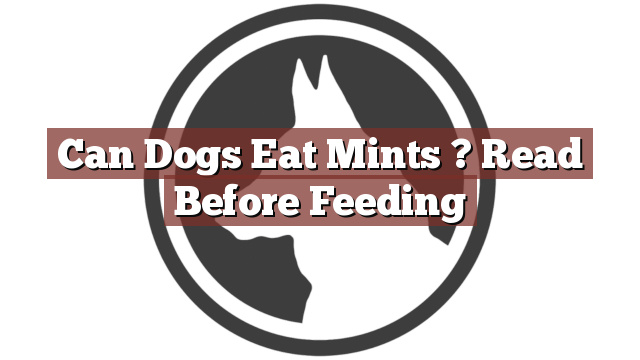Understanding Your Dog’s Dietary Needs
As a responsible pet owner, it is crucial to understand your dog’s dietary needs. Just like humans, dogs have specific dietary requirements to stay healthy and thrive. While dogs primarily rely on a balanced diet of high-quality dog food, it is natural for pet owners to wonder about other food items that their furry friends might enjoy. However, it is essential to remember that not all human food is suitable for dogs. Some foods can be harmful or even toxic to them.
Can Dogs Eat Mints? Read Before Feeding
Can dogs eat mints? This is a common question that many dog owners have. While mints may seem harmless to us, it is important to consider whether they are safe for our canine companions. The answer is no, dogs should not consume mints. Although a small amount of mint may not pose immediate danger, it is best to avoid feeding them to your dog.
Pros and Cons of Feeding Mints to Your Dog
When it comes to feeding mints to your dog, it is essential to weigh the pros and cons. While there may be some potential benefits, the risks outweigh them.
Pros of feeding mints to your dog:
- Fresh Breath: Mints can help freshen your dog’s breath, similar to how they work for humans.
Cons of feeding mints to your dog:
-
Toxicity: Certain types of mints, such as those containing xylitol, can be toxic to dogs. Xylitol is an artificial sweetener that can cause a severe drop in your dog’s blood sugar levels, leading to symptoms like weakness, vomiting, loss of coordination, and even seizures.
-
Digestive Issues: Mints, particularly those with a high menthol content, can cause digestive problems in dogs. It may lead to diarrhea, stomach upset, or even gastroenteritis.
-
Choking Hazard: Mints are small and can pose a choking hazard, especially for small dog breeds or dogs who tend to gulp their food without chewing properly.
In Conclusion: Proceed with Caution When Feeding Mints to Your Dog
While a small amount of mint may not cause immediate harm to your dog, it is best to err on the side of caution and avoid feeding mints to them altogether. The potential risks, such as xylitol toxicity and digestive issues, outweigh any potential benefits. If you are concerned about your dog’s breath, it is always best to consult with your veterinarian. They can recommend safe alternatives or provide guidance on maintaining your dog’s oral hygiene. Remember, providing a balanced and appropriate diet, along with regular veterinary care, is the key to keeping your furry friend healthy and happy.
Thank you for taking the time to read through our exploration of [page_title]. As every dog lover knows, our furry friends have unique dietary needs and responses, often varying from one canine to another. This is why it's paramount to approach any changes in their diet with caution and knowledge.
Before introducing any new treats or making alterations to your dog's diet based on our insights, it's crucial to consult with a veterinarian about [page_title]. Their expertise ensures that the choices you make are well-suited to your particular pet's health and well-being.
Even seemingly harmless foods can sometimes lead to allergic reactions or digestive issues, which is why monitoring your dog after introducing any new food item is essential.
The content provided here on [page_title] is crafted with care, thorough research, and a genuine love for dogs. Nevertheless, it serves as a general guideline and should not be considered a substitute for professional veterinary advice.
Always prioritize the expert insights of your veterinarian, and remember that the health and happiness of your furry companion come first.
May your journey with your pet continue to be filled with joy, love, and safe culinary adventures. Happy reading, and even happier snacking for your canine friend!

